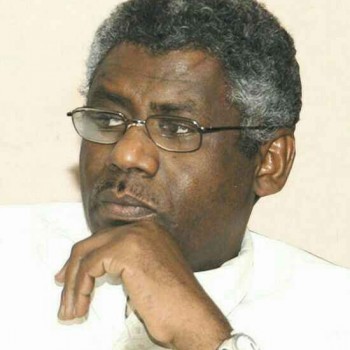Saudi Arabia Steps onto the Field (2/2)

As I See
Adel El-Baz
1
In the first part of this article, I mentioned that the Kingdom of Saudi Arabia has begun to chart a new, independent policy toward Sudan—one that considers its own interests and national security, along with its perception of the strategic threats surrounding the Horn of Africa, and its fear of being encircled.
This policy began with active diplomacy aimed at loosening the noose around Sudan’s neck and playing a decisive role in the Sudanese crisis. So, what exactly has Saudi Arabia done?
2
Saudi Arabia embarked on an intensive African diplomatic tour of the neighboring “belt” countries. In March, Deputy Foreign Minister Engineer Waleed bin Abdulkarim Al-Khuraiji visited Chad, Ethiopia, South Sudan, and Kenya. The discussions focused on achieving stability in Sudan amidst the country’s ongoing turmoil.
Notably, these same countries had been visited earlier on November 29 last year by Sheikh Shakhbout bin Nahyan Al Nahyan, Minister of State in the UAE. His tour also included Uganda and the Central African Republic—countries playing a significant role in exacerbating the political and military situation in Sudan by fully supporting the UAE-backed Janjaweed militia. In all these visits, Sudan was a central topic of discussion in the respective capitals.
3
Following the Deputy Minister’s tour of the belt countries, a high-level Saudi delegation visited the Sudanese city of Port Sudan. The delegation included representatives from the Ministry of Foreign Affairs, the Saudi Fund for Development, and the King Salman Humanitarian Aid and Relief Center. Al-Khuraiji met with officials from the Sudanese Ministry of Foreign Affairs and economic ministries.
Undoubtedly, discussions covered political and military aspects, particularly since the visit came after the announcement of the liberation of the Republican Palace (on March 26)—a significant turning point in the war that marked the Sudanese army’s progress and its approach toward areas still under militia control.
4
On March 23 of the same month, Saudi Arabia summoned Mahamat Déby (Mohamed Kaka), President of Chad, under the pretext of performing Umrah, thereby bypassing an invitation he was expected to accept from Abu Dhabi.
This summons was intended to foil a plan by the UAE’s Mohammed bin Zayed.
The Africa Confidential journal reported last month that Mahamat Déby visited Abu Dhabi in early March seeking reassurance, and noted that “his reception in N’Djamena indicates he returned disappointed.”
Some sources suggested that the purpose of his visit to Saudi Arabia was to hear the Kingdom’s opinion on his role in the Sudan war, and it was rumored he met with General al-Burhan—though these reports remain unconfirmed.
5
On Friday, March 28, 2025, General Abdel Fattah al-Burhan, President of the Sudanese Sovereign Council, arrived in Jeddah on an official visit.
Details about these high-level meetings remain scarce, but all indications suggest that al-Burhan returned from the Kingdom not only with promises, but with tangible support on all levels. The executive administration (Higher Coordination Committee) formed after his return began working the very next day, demonstrating seriousness.
6
In mid-February, Saudi Arabia declined to participate in a conference convened by the UAE in Addis Ababa under the title “High-Level Humanitarian Assistance,” after the Sudanese government boycotted it, describing it as a political bazaar under the guise of humanitarian aid, aimed at whitewashing the UAE’s bloody involvement in Sudan.
This means Saudi Arabia has withdrawn from the “Lifesaving Alliance” formed after last year’s Geneva Conference—a UAE initiative—signaling a further distancing from Abu Dhabi’s agenda and an open opposition to it.
7
Following the announcement of a founding alliance conference held in Nairobi, Kenya, on February 18, which aimed to form a parallel government in Sudan, Saudi Arabia declared in a statement on February 27:
“It rejects any illegal steps or actions outside the framework of Sudan’s official institutions that could undermine its unity or misrepresent the will of its people, including calls to form a parallel government.”
This indicates the Kingdom’s rejection of Abu Dhabi’s raw conspiracy to divide Sudan—similar to what it did in Libya and Yemen. In fact, Saudi Arabia led the entire Gulf bloc in rejecting the formation of such a government, as well as spearheaded the opposition across all Arab and Islamic organizations.
8
Indeed, Saudi Arabia’s recent active involvement in the Sudan file is not merely about resolving the crisis or curbing Abu Dhabi’s disastrous interventions in Sudan, nor is it solely about halting the UAE’s expanding influence that threatens Red Sea navigation and trade routes.
Rather, these moves fall within a broader strategic vision aimed at bolstering Saudi influence in Africa, protecting its economic interests, and ensuring regional security—especially amid fierce competition both inside and outside the Gulf.
Bringing the war to an end in favor of Sudan’s state institutions, and achieving a united and stable Sudan, is the cornerstone of this strategy. Without Sudan’s stability and victory in this war, there can be no stability in the Horn of Africa, no security in the Red Sea, and no safeguarding of the Gulf itself in the face of the UAE’s insatiable appetite to control ports, resources, and trade routes (Aden, Berbera, Port Sudan)—in a bid to create a political and military empire around the Gulf with far-reaching strategic implications for the entire region.



